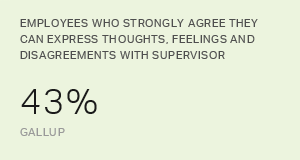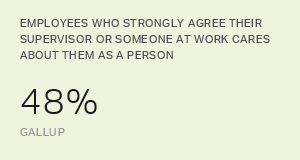Story Highlights
- Discover six points to help leaders successfully integrate people and AI
- The sooner business adapts to the new reality, the better
- Workers are anxious -- they need answers no one has yet
This article is the seventh and final in a series about how business leaders can become better prepared for managing the AI disruption.
In a recent speech, the CEO of AI startup Nara Logics, Jana Eggers, pulled back the curtain on the tech she's spent 30 years developing:
"Stop thinking AI is magic," she said. "Simply put, it's math with more equations and computation going on."
Eggers makes an instructive point -- AI's transformative power is not in the technology itself, it is in the way companies are able to apply it toward their unique goals.
Leaders who were present for the "PC revolution" (or who studied it in business school) have seen this happen before. PCs were supposed to change everything, and they did, but not immediately and with a great deal of variability in application.
And variability in users, too: Some enthusiastic early adopters made use of what was available as it came to market and went to the trouble of learning how to integrate it. Some holdouts waited until the tech became more user-friendly. The first group had a jump on productivity, but the second group didn't drive themselves crazy trying to get first-generation technology to work. Eventually, PCs became sufficiently well-engineered to the point that hardly anyone could argue people were better than machines at certain business operations.
The same thing is happening now with AI's equations and computations, but faster. Much faster, and with many more early adopters. Business leaders can't afford to be skeptical for very long, and they can't hold out for tech they're comfortable with -- or even for tech they understand. Competitors are already putting this generation's AI to work to gain a competitive advantage.
"What differentiates [the companies that benefit from AI] is the first-mover advantage," says Chief Technology Officer of Cloudera, Amr Awadallah. "Those organizations that are reaping the benefits today started thinking about AI up to eight years ago. They began building the proper foundations from a data-platform perspective. They started training their people in the skills required. Now, eight years later, they are at the point where they are truly able to leverage AI."
But leveraging AI, as Eggers said, involves employing a form of computational math -- some of which is useful to you, some of which isn't, but none of which will solve all of a business' challenges. AI will only increase performance or growth if it's used where it provides real value, if it helps fulfill the company's purpose and people believe it helps their companies perform better.
There's no way to predict the ways AI will change business in the future. Leaders can't even predict the impact of their current AI investments right now. But leaders can expect that the employee-AI interface will result in some challenges, just as adjusting to PCs once did. Facing those issues promptly, thoughtfully and wisely will improve outcomes and help businesses extract the most value from their tech investments -- and their customers.
Gallup's research indicates that certain company cultures have an advantage here. A commitment to ethics, agility, trust, curiosity and a real sense of purpose -- as explained below -- makes a company adaptable to tech and better able to spot opportunities and avoid problems.
1. Culture dictates success. Top technical talent will be important, but not all-important. The key to winning or losing will be leadership's ability to adopt new ways of thinking early, their readiness to re-invent themselves, and the speed with which they do both.
2. Align AI with vision. Agility allows companies to achieve outcomes in a dynamic environment by adjusting to changes rapidly and efficiently -- or it can push companies into an endless, chaotic struggle to reflect the ever-changing external conditions. The key is to have fixed goals that align with purpose and vision.
3. Encourage a culture of questions. Winning is the result of knowing why to do something. Everyone must be encouraged to ask why -- and keeping asking, all the time. That's how companies align AI with performance and performance with success.
4. Build a culture of security. AI can elicit feelings of insecurity and powerlessness. The task of leadership then is to provide a sense of stability, hope and empowerment without having the ability to predict the future and without having all the answers.
5. Ethics matter. Organizations need to go beyond a culture of compliance and build cultures of "doing the right thing" for its own sake. And AI makes "doing the right thing" a more far-reaching, subjective and abstract concept all the time.
6. Create trust. Leaders can instill a feeling that "we're all in the same boat" by aligning employee and organizational interests. But workers' willing buy-in with AI depends on their level of trust. Companies must establish a positive track record of using new technologies to benefit both the business and the employees to do this effectively.
The sooner business adapts to the new reality, the better. The pace of tech advancement is speeding up as AI learns to build itself. The competition is growing more aggressively, too, as barriers to entry fall. Meanwhile, workers are anxious about the future and looking for answers their leaders don't have.
Here's the thing: Not having the answers is OK. Admitting it is even better. Foreshadowing Jana Eggers by decades, the science-fiction writer Arthur C. Clarke said, "Any sufficiently advanced technology is indistinguishable from magic." AI is quite advanced and may seem like alchemy, but business leaders need to admit that it's not magic. It's just math.
But not every culture is prepared to make use of the math. The cultures that are ready to use the math are those with a purpose that guides the company toward a common vision, that invites everyone's input, that places a premium on deep questions and ethical behaviors, and that proves itself trustworthy. That's the kind of culture that not only survives the AI revolution, but takes competitive advantage of it.
All cultures must advance to that ideal, and few companies can afford to stall. In the past, PC skeptics and holdouts had time to get comfortable with tech before adopting it, but those days are over. The AI revolution began a long time ago, and its equations and computations are getting faster every day.
Read the first, second, third, fourth, fifth and sixth articles in this compelling seven-part series.
Discover how your company can create a performance management system that helps your employees become better prepared for the AI era:
- Register for our on-demand webinar on how to achieve cultural transformation.
- Download Gallup's perspective paper on culture to learn how to build a business that's ready for the future.
- Discover what Americans think about -- and what they can do to confront -- the AI revolution.


